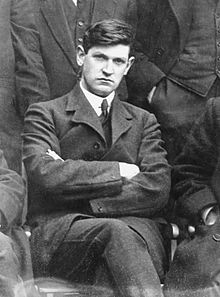
Back مايكل كولينز (سياسي أيرلندي) Arabic مايكل كولينز (عسكرى) ARZ Maykl Kollins (irland lider) Azerbaijani Майкл Колінз (Ірландыя) Byelorussian Майкъл Колинс (политик) Bulgarian Mícheál Ó Coileáin Breton Mícheál Ó Coileáin Catalan مایکڵ کۆلینز CKB Michael Collins (politik) Czech Michael Collins Welsh
This article may have too many section headers. (May 2024) |
Michael Collins | |
|---|---|
Mícheál Ó Coileáin | |
 Collins in 1919 | |
| Chairman of the Provisional Government | |
| In office 16 January 1922 – 22 August 1922 | |
| Preceded by | Office established |
| Succeeded by | W. T. Cosgrave |
| Minister for Finance | |
| In office 2 April 1919 – 22 August 1922 | |
| Preceded by | Eoin MacNeill |
| Succeeded by | W. T. Cosgrave |
| Minister for Home Affairs | |
| In office 22 January 1919 – 1 April 1919 | |
| Preceded by | Office established |
| Succeeded by | Arthur Griffith |
| Teachta Dála | |
| In office May 1921 – August 1922 | |
| Constituency | Cork Mid, North, South, South East and West |
| In office December 1918 – May 1921 | |
| Constituency | Cork South |
| President of the Irish Republican Brotherhood | |
| In office November 1920 – 22 August 1922 | |
| Preceded by | Patrick Moylett |
| Succeeded by | Richard Mulcahy |
| Personal details | |
| Born | 16 October 1890 Woodfield, Clonakilty, County Cork, Ireland |
| Died | 22 August 1922 (aged 31) Béal na Bláth, County Cork, Ireland |
| Manner of death | Assassination |
| Resting place | Glasnevin Cemetery |
| Political party | Sinn Féin (pro-treaty faction) |
| Relatives |
|
| Signature | |
| Nickname | The Big Fellow |
| Military service | |
| Allegiance | |
| Years of service | 1909–1922 |
| Rank | General |
| Battles/wars | |
Michael Collins (Irish: Mícheál Ó Coileáin;[1] 16 October 1890 – 22 August 1922) was an Irish revolutionary, soldier and politician who was a leading figure in the early-20th century struggle for Irish independence.[2] During the War of Independence he was Director of Intelligence of the Irish Republican Army (IRA) and a government minister of the self-declared Irish Republic. He was then Chairman of the Provisional Government of the Irish Free State from January 1922 and commander-in-chief of the National Army from July until his death in an ambush in August 1922, during the Civil War.
Collins was born in Woodfield, County Cork, the youngest of eight children. He moved to London in 1906 to become a clerk in the Post Office Savings Bank at Blythe House. He was a member of the London GAA, through which he became associated with the Irish Republican Brotherhood and the Gaelic League. He returned to Ireland in January 1916 and fought in the Easter Rising. He was taken prisoner and held in the Frongoch internment camp as a prisoner of war, but he was released in December 1916.
Collins subsequently rose through the ranks of the Irish Volunteers and Sinn Féin. He was elected as MP for South Cork in December 1918. Sinn Féin's elected members (later known as TDs) formed an Irish parliament, the First Dáil, in January 1919 and declared the independence of the Irish Republic. Collins was appointed Minister for Finance. In the ensuing War of Independence, he was Director of Organisation and Adjutant General for the Irish Volunteers, and Director of Intelligence of the IRA. He gained fame as a guerrilla warfare strategist, planning many successful attacks on British forces together with 'the Squad', such as the "Bloody Sunday" assassinations of key British intelligence agents in November 1920.
After the July 1921 ceasefire, Collins was one of five plenipotentiaries sent by the Dáil cabinet at the request of Éamon de Valera, to negotiate peace terms in London. The resulting Anglo-Irish Treaty, signed in December 1921, would establish the Irish Free State but depended on an oath of allegiance to the Crown. This was the clause in the treaty de Valera and other republican leaders found hardest to accept. Collins viewed the treaty as offering "the freedom to achieve freedom", and helped persuade a majority of the Dáil to ratify the treaty. A provisional government was formed under his chairmanship in early 1922. During this time he secretly provided support for an IRA offensive in Northern Ireland. It was soon disrupted by the Irish Civil War, in which Collins was commander-in-chief of the National Army. He was shot and killed in an ambush by anti-Treaty forces in August 1922.
- ^ Ryan, Meda (2006). Michael Collins and the Women Who Spied for Ireland (2nd ed.). Cork: Mercier Press. p. 71. ISBN 978-1856355131. Archived from the original on 26 December 2018. Retrieved 23 March 2018.
- ^ "Michael Collins". Oireachtas Members Database. Archived from the original on 30 August 2018. Retrieved 1 June 2009.
© MMXXIII Rich X Search. We shall prevail. All rights reserved. Rich X Search